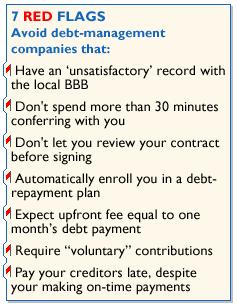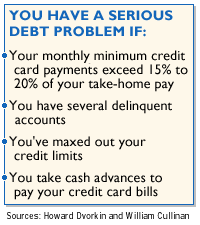|
'Click here to be debt-free'
What you should know before signing up with a credit counseling agency
NEW YORK (CNN/Money) - You just can't face another month of credit card bills. Your minimum payments alone total hundreds of dollars. Of course, a day doesn't go by that you're not bombarded with e-mail and TV ads for companies promising to reduce your monthly payments, lower your interest rates and stop creditors from harassing you. If that's begun to sound like music to your ears, consumer advocates have two words for you: "Buyer beware."
And it may get wilder still if federal legislation requiring people to get credit counseling before filing for bankruptcy passes into law. Not that there aren't reputable firms. There are. But credit counseling agencies tend to fall into one of three categories: the good, the bad and the ugly. Knowing the difference can save you a lot of heartache -- and money. Until recently, credit counseling agencies were molded in a social service tradition, and most were reputable non-profits known as consumer credit counseling services (CCCS) affiliated with the National Foundation for Credit Counseling (NFCC). Together, NFCC members have 1,300 branch offices around the country. But in recent years, as the ranks of the indebted swelled, a number of businesses -- some reputable, many not -- sprang up. Regardless of their origins, these agencies all promise to get you out of debt. But do their debt management programs work? The answer is "Sometimes -- if they're done right." At its best, a debt management program (DMP) can get you a reduction in interest rates, an elimination of finance charges, lower monthly payments, relief from collection agents, and one-stop bill paying. (Services are only offered for unsecured debt, such as credit cards. Unsecured debt is debt that is not backed by collateral. Your mortgage, by contrast, is secured debt since it's backed by your house.) After consulting with you and reviewing your assets, liabilities and spending habits, the agency sees what kind of deal it can get with your creditors and figures how much you need to pay each month to clear your debt. You pay the agency that amount each month and it, in turn, pays each of your creditors. A plan is not worth your while if it can't clear your debt within five years. Once you sign up, your creditors will close the accounts you're consolidating and you will not be allowed to apply for new credit while in the program. Since your credit limits will be reduced, your credit rating may also take a temporary hit. These services aren't free. Though credit counseling agencies get a cut of collected money from creditors, those "fair-share contributions" have been cut severely, forcing agencies to rely more on fees from clients. To get an idea of what's reasonable, consider what members of the industry's trade associations charge. NFCC members' average fees are among the lowest ($14 for a counseling session; $19 to set up an account; and $12 as a monthly service fee). Individual member offices may charge more than the average, but they are expected to keep fees low and can't turn people away who can't afford them. Members of the Association of Independent Consumer Credit Counseling Agencies (AICCCA) may not charge more than $75 to set up a DMP account or charge more than $50 in monthly service fees. Clients typically pay for counseling, a one-time set-up fee, and a monthly maintenance fee. So beware agencies that also charge an application fee, a membership fee, a hefty upfront fee often called a "voluntary contribution," or a per-creditor fee on top of monthly maintenance. (For more on fees to avoid, click here.) Like a lot of people, you may assume that if an agency is nonprofit that means it will be low cost and trustworthy. Not so. Nonprofits are not limited in what they can charge you or in what they pay their staff. And many businesses in the industry have re-organized as nonprofits -- not for your benefit but in part to better qualify for creditor contributions. Debt repayment plans aren't for everyone. One sign you might benefit from outside help is if you have more than one delinquent account and your monthly minimum required payments on your unsecured debt exceed 20 percent of your take-home pay, said William Cullinan, interim president of the NFCC. If you decide that a credit counseling agency might be the solution, "Don't rely on the promises they make. Investigate the companies," said Kim Overman, vice president of the BBB of Southeast Florida. Following are seven ways to assess a company's worth. Check with the Better Business Bureau. Walk away from companies and agencies with an "unsatisfactory record" at the BBB. (You can look a company's record up here.) Serious, unresolved complaints, such as late payments to creditors and false advertising, will be noted. You'll also learn what other names the company operates under and how long the company has been around. Look up those other company names as well. And don't work with a company in business less than five years, suggested Howard Dvorkin, president of Consolidated Credit Counseling Services in Ft. Lauderdale, Fla. and AICCCA vice president. Mind the fees. Steer clear of agencies that say they have no upfront fees but tuck a sentence into your contract stating, "I voluntarily agree to contribute one month's payment..." A "voluntary contribution" that is non-negotiable is a red flag. So are upfront fees that are a percentage of your debt load. "Once they get the upfront fee, there's no incentive to help you," said Robert Manning, author of "Credit Card Nation." Also, "be careful of open-ended fees that accumulate," Plunkett said. For example, some agencies charge a per-creditor fee on top of a monthly processing fee, even though they don't negotiate with your creditors every month, Manning said. Generally speaking, if you're paying more than $50 a month all told, that's too high, Dvorkin said. Look for easy-to-understand contracts. "The more complex the contract, the more I'd stay away from it," Manning said. A contract should state clearly how much you'll pay in total fees and when the agency will process your payments. A good agency also lets you review a contract at home before signing it. Manning recommends comparing three or four contracts from different companies to see who'll give you the best deal. Choose a company that can help with all your accounts. Before signing on, "make sure a creditor deals with the company you choose," Overman said. Ideally, an agency should have a relationship with all your creditors, not just a few. Check out the agency's credentials. Membership in the Better Business Bureau or membership in one or both of the industry's trade associations -- the NFCC and AICCCA -- can be a plus since both have adopted rules and accreditation standards. But membership alone is not enough. It should be considered in conjunction with other factors, such as fee structure and customer satisfaction. If a counselor uses a stopwatch, run. If an agency promises to enroll you in a debt-repayment plan in 20 minutes, get outta Dodge. "The fly-by-nights don't want to spend any time with you," Manning said, noting the less time spent with you, the less a company works in your best interest. Make sure they pay when they say. Even though you're employing a middleman, your primary relationship is still with your creditors, Manning said. So, don't just write a check every month to the credit counseling agency and assume all is hunky-dory. Check the statements your creditors send you or call them to make sure your accounts have been paid on time. Otherwise, you may accrue penalty fees and end up with more debt than before.
Do the math. Consumer experts caution that in the past three years creditors have become far more reluctant to make big rate cuts for anyone. So make sure your plan will save you money in the long run, after factoring in the rate savings and the total cost in fees. Remember, too, paying off your debt is a long-term positive for your credit score, but in the short-term it will take a hit since many of your credit accounts will be closed. That means while you're in the plan you're not likely to get competitive rates on home or car loans and lenders may consider you a higher risk. So factor in the cost of higher rate loans if you need to take them while on the plan. |
|


